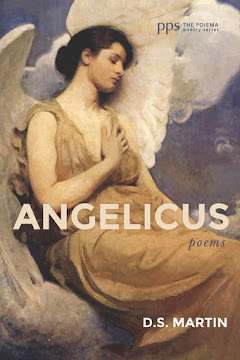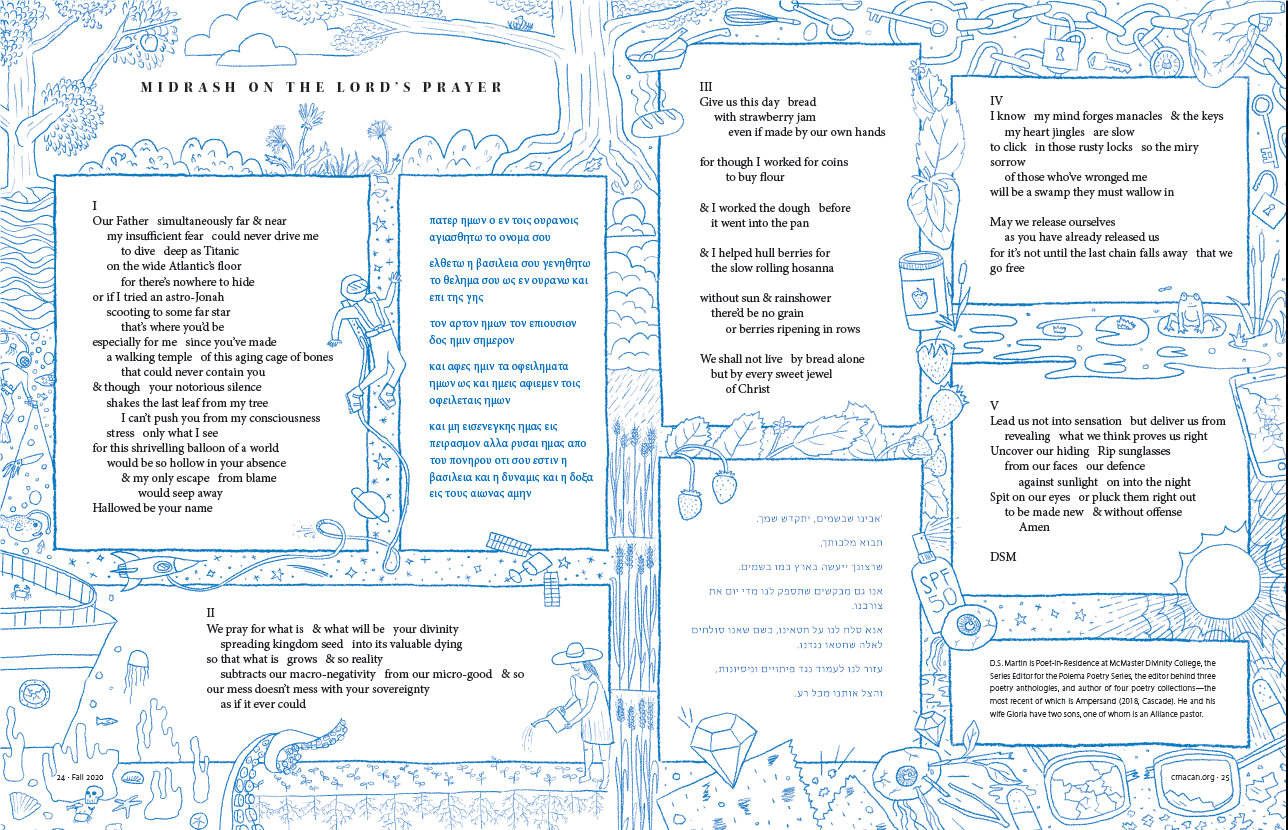David Gascoyne (1916—2001) is an English poet often associated with the surrealist movement. His first poetry collection appeared when he was just sixteen. He became a friend and collaborator with Salvador Dali, and wrote the influential 1935 book, A Short Survey of Surrealism.
Gascoyne's life has been described as a long search for meaning. At nineteen he became a member of the Communist Party, but became disillusioned when he saw how communists behaved; he also later found surrealism dissatisfying. He suffered from mental illness and was addicted to amphetamines for years, but he managed to break the habit. His 1956 book Night Thoughts evidences his turn from surrealism, toward metaphysical and religious poetry.
When he was a patient in Whitecroft Hospital on the Isle of Wight, he met his wife Judy who was a volunteer. She said:
---------"One of my favourite poems was called 'September
---------"Sun'. I read it one afternoon and one of the
---------patients came up to me afterwards and said 'I
---------wrote that', I put my hand on his shoulder and
---------said 'Of course you did, dear'. Then of course
---------when I got to know him I realised he had."
David Gascoyne once said, "The poet's job is to go on holding on to something like faith, through the darkness of total lack of faith...the eclipse of God."
Ecce Homo
Whose is this horrifying face,
This putrid flesh, discoloured, flayed,
Fed on by flies, scorched by the sun?
Whose are these hollow red-filmed eyes
And thorn-spiked head and spear-stuck side?
Behold the Man: He is Man’s Son.
Forget the legend, tear the decent veil
That cowardice or interest devised
To make their mortal enemy a friend,
To hide the bitter truth all His wounds tell,
Lest the great scandal be no more disguised:
He is in agony till the world’s end,
And we must never sleep during that time!
He is suspended on the cross-tree now
And we are onlookers at the crime,
Callous contemporaries of the slow
Torture of God. Here is the hill
Made ghastly by His spattered blood
Whereon He hangs and suffers still:
See, the centurions wear riding-boots,
Black shirts and badges and peaked caps,
Greet one another with raised-arm salutes;
They have cold eyes, unsmiling lips;
Yet these His brothers know not what they do.
And on his either side hang dead
A labourer and a factory hand,
Or one is maybe a lynched Jew
And one a Negro or a Red,
Coolie or Ethiopian, Irishman,
Spaniard or German democrat.
Behind his lolling head the sky
Glares like a fiery cataract
Red with the murders of two thousand years
Committed in His name and by
Crusaders, Christian warriors
Defending faith and property.
Amid the plain beneath His transfixed hands,
Exuding darkness as indelible
As guilty stains, fanned by funereal
And lurid airs, besieged by drifting sands
And clefted landslides our about-to-be
Bombed and abandoned cities stand.
He who wept for Jersualem
Now sees His prophecy extend
Across the greatest cities of the world,
A guilty panic reason cannot stem
Rising to raze them all as He foretold;
And He must watch this drama to the end.
Though often named, He is unknown
To the dark kingdoms at His feet
Where everything disparages His words,
And each man bears the common guilt alone
And goes blindfolded to his fate,
And fear and greed are sovereign lords.
The turning point of history
Must come. Yet the complacent and the proud
And who exploit and kill, may be denied—
Christ of Revolution and of Poetry—
The resurrection and the life
Wrought by your spirit’s blood.
Involved in their own sophistry
The black priest and the upright man
Faced by subversive truth shall be struck dumb,
Christ of Revolution and of Poetry,
While the rejected and condemned become
Agents of the divine.
Not from a monstrance silver-wrought
But from the tree of human pain
Redeem our sterile misery,
Christ of Revolution and of Poetry,
That man’s long journey
May not have been in vain.
Entry written by D.S. Martin. His latest poetry collection, Conspiracy of Light: Poems Inspired by the Legacy of C.S. Lewis, is available from Wipf & Stock as is his earlier award-winning collection, Poiema.
Monday, March 30, 2015
Monday, March 23, 2015
Henry Vaughan*
Henry Vaughan (1622?—1655) was born in Wales. He and his twin brother, Thomas, entered Jesus College at Oxford in 1638. Thomas became a noted philosopher after graduation, however Henry left to pursue a law career in London before attaining his degree. At the outbreak of the English Civil War, Henry returned to Wales and dedicated himself to military service in the Royalist cause.
Vaughan's early verse is typical of the "Sons of Ben" who were followers of Ben Jonson. After a spiritual awakening in 1648, Henry Vaughan's poetry demonstrates the influence of metaphysical poets such as John Donne, and especially of George Herbert. He acknowledges the spiritual influence of Herbert: "whose holy life and verse gained many pious converts, of whom I am the least."
Palm Sunday
Hark! how the children shrill and high
Hosanna cry,
Their joys provoke the distant sky,
Where thrones and seraphims reply,
And their own angels shine and sing
In a bright ring:
Such young, sweet mirth
Makes heaven and earth
Join in a joyful symphony.
*This is the second Kingdom Poets post about Henry Vaughan: first post, third post.
Entry written by D.S. Martin. His latest poetry collection, Conspiracy of Light: Poems Inspired by the Legacy of C.S. Lewis, is available from Wipf & Stock as is his earlier award-winning collection, Poiema.
Vaughan's early verse is typical of the "Sons of Ben" who were followers of Ben Jonson. After a spiritual awakening in 1648, Henry Vaughan's poetry demonstrates the influence of metaphysical poets such as John Donne, and especially of George Herbert. He acknowledges the spiritual influence of Herbert: "whose holy life and verse gained many pious converts, of whom I am the least."
Palm Sunday
Hark! how the children shrill and high
Hosanna cry,
Their joys provoke the distant sky,
Where thrones and seraphims reply,
And their own angels shine and sing
In a bright ring:
Such young, sweet mirth
Makes heaven and earth
Join in a joyful symphony.
*This is the second Kingdom Poets post about Henry Vaughan: first post, third post.
Entry written by D.S. Martin. His latest poetry collection, Conspiracy of Light: Poems Inspired by the Legacy of C.S. Lewis, is available from Wipf & Stock as is his earlier award-winning collection, Poiema.
Monday, March 16, 2015
Charlotte Brontë
Charlotte Brontë (1816—1855) is the eldest of the three famous Brontë sisters. She had had two older sisters who both died in childhood. Her mother also died when Charlotte was 5-years-old. Her father was an evangelical Anglican priest who was appointed Rector of Haworth in Yorkshire in 1820.
Charlotte, Emily and Anne, became their own literary community — assisting each other with their poetry and fiction. Charlotte is best remembered as the author of the novel Jane Eyre (1847). She received two offers of marriage in 1839, another in 1851, and finally in 1854 she married Arthur Bell Nicholls — her father's Curate.
Her remaining siblings all died prematurely: her brother Branwell and sister Emily in 1848, and lastly Anne in 1849. Charlotte, herself died in 1855 due to overwhelming sickness during her pregnancy.
On The Death Of Anne Brontë
There's little joy in life for me,
And little terror in the grave;
I 've lived the parting hour to see
Of one I would have died to save.
Calmly to watch the failing breath,
Wishing each sigh might be the last;
Longing to see the shade of death
O'er those belovèd features cast.
The cloud, the stillness that must part
The darling of my life from me;
And then to thank God from my heart,
To thank Him well and fervently;
Although I knew that we had lost
The hope and glory of our life;
And now, benighted, tempest-tossed,
Must bear alone the weary strife.
This is the first Kingdom Poets post about Charlotte Brontë: second post.
Entry written by D.S. Martin. His latest poetry collection, Conspiracy of Light: Poems Inspired by the Legacy of C.S. Lewis, is available from Wipf & Stock as is his earlier award-winning collection, Poiema.
Charlotte, Emily and Anne, became their own literary community — assisting each other with their poetry and fiction. Charlotte is best remembered as the author of the novel Jane Eyre (1847). She received two offers of marriage in 1839, another in 1851, and finally in 1854 she married Arthur Bell Nicholls — her father's Curate.
Her remaining siblings all died prematurely: her brother Branwell and sister Emily in 1848, and lastly Anne in 1849. Charlotte, herself died in 1855 due to overwhelming sickness during her pregnancy.
On The Death Of Anne Brontë
There's little joy in life for me,
And little terror in the grave;
I 've lived the parting hour to see
Of one I would have died to save.
Calmly to watch the failing breath,
Wishing each sigh might be the last;
Longing to see the shade of death
O'er those belovèd features cast.
The cloud, the stillness that must part
The darling of my life from me;
And then to thank God from my heart,
To thank Him well and fervently;
Although I knew that we had lost
The hope and glory of our life;
And now, benighted, tempest-tossed,
Must bear alone the weary strife.
This is the first Kingdom Poets post about Charlotte Brontë: second post.
Entry written by D.S. Martin. His latest poetry collection, Conspiracy of Light: Poems Inspired by the Legacy of C.S. Lewis, is available from Wipf & Stock as is his earlier award-winning collection, Poiema.
Monday, March 9, 2015
Ralph Knevet
Ralph Knevet (1601—1671) is an English poet and clergyman who saw himself as a disciple of George Herbert. His play Rhodon and Iris was first performed in 1631. His MS. Supplement of the Faery Queene in Three Books first appeared in 1633, showing his appreciation of Edmund Spenser. In the 1640s Knevet composed his Gallery to the Temple; in the preface he said of Herbert, "it was Hee who rightly knew to touch Davids harpe".
In 1652 he became the Rector of Lyng, Norfolk, where he lived for the rest of his life.
The Harp
---Some may occasion chance to carp
Saying that I have sung to Nero's harp,
And therefore am for David's most unfit,
Which piety requires, as well as wit;
---But thus, I my defence prepare,
---Showing how I have travelled far,
And by the streams of Babylon have sate,
Where I deplored my sad and wretched state;
---Upon a willow there I hung
---That harp to which I whilome sung:
This tree, which neither blossoms yields, nor fruit;
Did with this instrument unhappy suit:
---There let it hang, consume, and rot
---Since I a better harp have got,
Which doth in worth as far surpass the other,
As Abel in devotion, did his brother.
Entry written by D.S. Martin. His latest poetry collection, Conspiracy of Light: Poems Inspired by the Legacy of C.S. Lewis, is available from Wipf & Stock as is his earlier award-winning collection, Poiema.
In 1652 he became the Rector of Lyng, Norfolk, where he lived for the rest of his life.
The Harp
---Some may occasion chance to carp
Saying that I have sung to Nero's harp,
And therefore am for David's most unfit,
Which piety requires, as well as wit;
---But thus, I my defence prepare,
---Showing how I have travelled far,
And by the streams of Babylon have sate,
Where I deplored my sad and wretched state;
---Upon a willow there I hung
---That harp to which I whilome sung:
This tree, which neither blossoms yields, nor fruit;
Did with this instrument unhappy suit:
---There let it hang, consume, and rot
---Since I a better harp have got,
Which doth in worth as far surpass the other,
As Abel in devotion, did his brother.
Entry written by D.S. Martin. His latest poetry collection, Conspiracy of Light: Poems Inspired by the Legacy of C.S. Lewis, is available from Wipf & Stock as is his earlier award-winning collection, Poiema.
Monday, March 2, 2015
Asaph
Asaph has had twelve of the psalms in the Old Testament Psalter (Psalms 50 and 73-83) attributed to him. He was one of King David's chief musicians, appointed to play such instruments as lyres, harps, and cymbals (1 Chronicles 15). He later performed at the dedication of Solomon's Temple, according to 2 Chronicles 5:12.
The following translation of Psalm 75 comes from the new Passion Translation by Brian Simmons which first appeared in 2014. Other portions of scripture available in this translation at this point include John, Song of Songs, Hebrews and James.
Psalm 75 — A Cup in God's Hand
To the Pure and Shining One
Asaph's poetic song to the tune "Do Not Destroy"
God, our hearts spill over with praise to you!
We overflow with thanks, for your name is the "Near One."
All we want to talk about is your wonderful works!
And we hear your reply:
"When the time is ripe I will arise,
And I will judge the world with perfect righteousness!
Though I have set the earth firmly on its pillars
I will shake it until it totters and everyone's hearts will tremble."
--------------------------------------------Pause in his presence
God warns the proud, "Stop your arrogant boasting!"
And he warns the wicked,
"Don't think for a moment you can resist me!
Why would you speak with such stubborn pride?
Don't you dare raise your fist against me!"
This I know: the favor that brings promotion and power
Doesn't come from anywhere on earth,
For no one exalts a person but God, the true Judge of all.
He alone determines where favor rests.
He anoints one for greatness,
And brings another down to his knees.
A foaming cup filled with judgement mixed with fury,
Is in the hands of the Lord Jehovah,
Full to the brim and ready to run over.
He filled it up for the wicked and they will drink it,
Down to the very last drop!
But I will proclaim the victory of the God of Jacob.
My melodies of praise will make him known.
My praises will break the powers of wickedness
While the righteous will be promoted and become powerful!
Entry written by D.S. Martin. His latest poetry collection, Conspiracy of Light: Poems Inspired by the Legacy of C.S. Lewis, is available from Wipf & Stock as is his earlier award-winning collection, Poiema.
The following translation of Psalm 75 comes from the new Passion Translation by Brian Simmons which first appeared in 2014. Other portions of scripture available in this translation at this point include John, Song of Songs, Hebrews and James.
Psalm 75 — A Cup in God's Hand
To the Pure and Shining One
Asaph's poetic song to the tune "Do Not Destroy"
God, our hearts spill over with praise to you!
We overflow with thanks, for your name is the "Near One."
All we want to talk about is your wonderful works!
And we hear your reply:
"When the time is ripe I will arise,
And I will judge the world with perfect righteousness!
Though I have set the earth firmly on its pillars
I will shake it until it totters and everyone's hearts will tremble."
--------------------------------------------Pause in his presence
God warns the proud, "Stop your arrogant boasting!"
And he warns the wicked,
"Don't think for a moment you can resist me!
Why would you speak with such stubborn pride?
Don't you dare raise your fist against me!"
This I know: the favor that brings promotion and power
Doesn't come from anywhere on earth,
For no one exalts a person but God, the true Judge of all.
He alone determines where favor rests.
He anoints one for greatness,
And brings another down to his knees.
A foaming cup filled with judgement mixed with fury,
Is in the hands of the Lord Jehovah,
Full to the brim and ready to run over.
He filled it up for the wicked and they will drink it,
Down to the very last drop!
But I will proclaim the victory of the God of Jacob.
My melodies of praise will make him known.
My praises will break the powers of wickedness
While the righteous will be promoted and become powerful!
Entry written by D.S. Martin. His latest poetry collection, Conspiracy of Light: Poems Inspired by the Legacy of C.S. Lewis, is available from Wipf & Stock as is his earlier award-winning collection, Poiema.
Subscribe to:
Posts (Atom)























